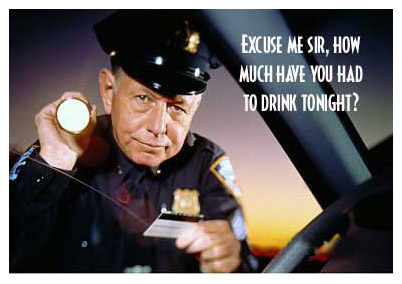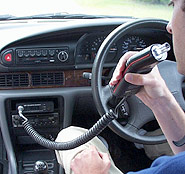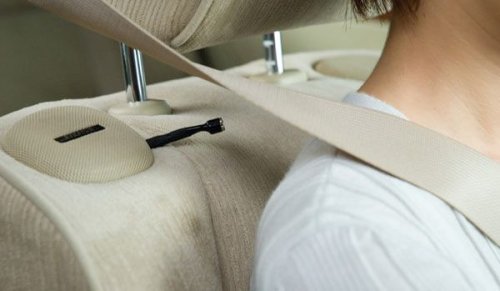Should In-Car Alcohol Detection Systems Be Mandatory?
Jason Lancaster | Apr 28, 2008 | Comments 19

Of the 42,000 traffic-related deaths each year, approximately 18,000 are said to be caused by alcohol. Considering most of these deaths (if not all) could be prevented, it makes sense to consider mandatory alcohol detection systems in all cars.
 Studies have shown that current alcohol detection systems, known as interlock devices, do a great job of preventing drinking and driving. However, most consumers and manufacturers have resisted installing these systems in all cars. Vehicle manufacturers dislike interlock devices because of there bulk and expense. Consumers dislike them because they’re very intrusive. Many drivers (most of whom are responsible and sober) resent having to breath into an interlock device in order to start their car, and understandably so.
Studies have shown that current alcohol detection systems, known as interlock devices, do a great job of preventing drinking and driving. However, most consumers and manufacturers have resisted installing these systems in all cars. Vehicle manufacturers dislike interlock devices because of there bulk and expense. Consumers dislike them because they’re very intrusive. Many drivers (most of whom are responsible and sober) resent having to breath into an interlock device in order to start their car, and understandably so.
But what about a more passive system for detecting alcohol? No bulky breathing device, no expensive equipment. Just a simple set of completely passive sensors that keep people from drinking and driving. Technological advances in alcohol detection are making this idea a reality.
In 2007, Nissan Motor Co. created a concept vehicle to showcase the advances in passive vehicle alcohol detection. The two part system featured:
- a sensor on the shifter/transmission stalk that measured the alcohol content in sweat from the driver’s hands and
- a “sniffer” that detects alcohol molecules present in the air inside the vehicle’s cabin, presumably from the driver’s breath.
Nissan’s system could disable the starter (like the interlock device), or shut off the vehicle’s engine when the car comes to a complete stop (like at a stop sign or intersection). It could even “tattle” on it’s driver by calling local police and telling them where the car is using an onboard GPS and cell phone system.

Nissan’s passive alcohol “sniffer” measures alcohol molecules in the air.
Interest in this technology is significant. NHTSA, (the National Highway Traffic Safety Administration) in conjunction with the Automotive Coalition for Traffic Safety, recently decided to fund research into a Driver Alcohol Detection System for Safety (DADSS). The goal of the DADSS is for the technology to be unobtrusive and not impact sober drivers in any event, while still preventing drinking and driving. It is hoped that the technology will also be inexpensive and maintenance-free.
The implications of this research grant are obvious: If someone can figure out a way to incorporate a cheap and reliable alcohol detection system into new cars, government regulators will likely make them mandatory. The talk is that these systems, assuming the technology continues to develop, will be required by 2018.
But what impact will these systems have? Will the system be able to differentiate between a driver who’s had one beer and a driver who’s had a dozen? Can a detection system determine if the driver is sober, even when all of the passengers are not? How will consumers like the system? Despite the obvious insurance benefits (rates would undoubtedly be lower for a car equipped with an alcohol detection system), will consumers tolerate this feature? Will some consider it an invasion of privacy?
What do you think – should new cars come with an alcohol detection system? Should the system be mandatory?
Search terms people used to find this page:
- tundraheadquarters
Filed Under: Auto News


This is absolutely the most dimwitted idea I’ve heard of. I’m 34. I don’t drink at all (and never have). I do use mouthwash every morning. How long will I have to wait before I can leave for work in the morning?
Whoever came up with this idiocy shouldn’t be allowed to drive, vote, or breed. They obviously have no concept of inductive reasoning and couldn’t possibly have enough sense to step out of the rain. Utter jackassery at it’s worst.
Jim – As you point out, the system would need to be pretty sophisticated to make out the difference between people using mouthwash and people drinking alcohol. As for your point about this policy making no sense, half the people that answered the pole agree with you. We wrote about it because it’s news worthy.
This is absolutely the most stupidest idea I ever heard of, it is a an invasion of privacy. A person’s car or vehicle is an extension of their home and so the police need to respect that.
how on earth can this be an invasion of privacy. R u kidding me.. My right to have a living child supercedes your right to good breath dimwit. the system that is dveloped would need to be sophisticated .. surely, you people can extend your compassion & mentality to realise that you share the road with irresponsible drunk drivers & don’t we all have the right to drive safely & to arrive alive at our destinations.
I have to vote with Margot on this one – the expectation of privacy here is outweighed by the safety of everyone on the road. I’m not a fan of the tattle feature – that’s crossing the line – but I’m all for a system that keeps people from driving a vehicle if they’re intoxicated. The devil, as they say, is in the details. Can this system, or any passive system, work effectively or correctly? The challenges we mentioned in our article have yet to be overcome…
as usual
steal rights
to hell with the bill of rights,
must be a terriorist issue here
but if it could be set at .05 and unobtrusive, why not… no mouthwash by teetootlers will set it off unless they are drinking a bottle in the morning.. which I suspect is the case bymost of the goody two shoes…haha
Dan – I don’t think that driving is a right – I think it’s a privilege. Privacy isn’t technically a right, but I believe it should be. Still, neither driving or privacy are protected by the bill of rights. Ultimately, I’m not sure that the benefits of privacy should extend to driving drunk. It certainly doesn’t pass the logic test.
Most of these comments are from ill informed people – so let me set the record straight on a few things based on fact.
Mouthwash – unless you use mouthwash as you are walking down your driveway, using mouthwash will not affect your ability to drive your car. It dissapates within 2 minutes. You’ll still be putting your shoes on and grabbing your keys. Worse case scenario if you like to use your mouthwash while sitting in your driveway, you just have to rinse with water afterwards. Might take an additional 7 seconds. But who uses mouthwash in their driveway anyway?
Car is an extension of your home – I don’t even know how to respond to this. In your car, you are on public property sharing the roads with other citizens who are all ordered to follow laws. In your house, you do as you please. At home you can get drunk or walk around naked. In public, you’d be arrested for public intoxication and indecent exposure – so how can anyone argue “your car is an extension of your home”? Once you cross your property line and/or conduct actions that potentially impact the safety of others, the police have every right to do what they do. That’s why we pay taxes.
A passive alcohol detection system is ideal IF IT WORKS. No intrusion. No hassle. No manufacturer has figured it out yet (perfectly), but with any technology, you start with an idea, then prototype, then eventually it makes its way into production. It will be less intrusive that clicking your seatbelt once it’s figured out. 5-10 years until that time though.
Shawn talk to Louisiana about the car being an extention of your home. There it is. I don’t make the laws there, I just follow them. Example if someone breaks into your home you can use what force deems neccessary to stop the intruder. Well your car is the same if they break into it. That’s as far as it goes. As they tried to explain the problem about the one person who is the designated driver and he has four other drunk passengers with him then the car won’t start because the alcohol is present because the passengers. This would also happened to a taxi cab driver if he picks up a drunk to take him home and the sensors pick up on it. I very seldom drink and when I do it’s at home on a weekend or a day that I know I don’t have to work the next day. I particular don’t care for this system. Whether you see it or not but your rights are slowly being taken away little by little. Jason it’s a priviledge to have a driver license. When they revoke your license they revoke your priviledge to drive. Ohh about the mouthwash apparently you haven’t tried blowing into that tube before. Mouthwash will trigger the sensor if it’s strong enough. Go ahead and take the blow test from a cop and see how your alcohol content is. Oh BTW the mouthwash I use “Equate” the cheap Walmart brand ohh yeah it has 21.6% alcohol in it. Imagine that. Oh yeah don’t have a cold and use your cough medicine and whammo no work today. Each person may react different to these two things I mention but who’s going to be the person they will model after. I don’t care for the drunk driver being on the road either. They already have in place methods of finding these people.
Shawn – Great comments. I agree that a home and a vehicle don’t entail the same rights, even if they are legally considered similar (as Mickey pointed out). I also believe that mouthwash, cough syrup, and a host of other consumer products might cause false positives with the “sniff” sensor, but the technology being tested would also include a system for measuring alcohol output in sweat glands on your hands…but this begs the question “What if I wear gloves?”
Perhaps these sensors combined with some electronics that measure vehicle inputs (like steering wheel motion, brakes, and throttle) could be used to determine if a driver is inebriated. It’s an interesting idea…but as Mickey has pointed out, we already have a system in place for catching drunk drivers that’s much less complicated. Too bad it doesn’t work better. All in all Shawn, great points, great analysis, great comment – keep em’ coming. This is one of my favorite posts.
Mickey – Good points as well – I love discussing this topic. There are a lot of issues at play here and the responses from people are incredible. As you say, driving is a privilege – I was trying to be diplomatic.
Nothing diplomatic about it Jason. It is what it is. Be nice or don’t drive. Maybe go to your room without dinner….LOL…
Passive alcohol sensors DO pick up on mouthwash. Not because you swallowed it, but because there are vapors in your mouth. THey also pick up on hand sanitizer, and colonge/perfume/body spray.
It doesn’t matter if it dissipates w/in 2 minutes…if you car is on recirculating air, where is it dissipating to? Um, it is dissipating into the air of the car…and recirculating over and over and over. There’s no where for it to go so the sensor will pick it up for MUCH longer than 2 minutes. More like over an hour.
In addition, intoxicated backseat passengers also set off the sensor.
Oh, and if your windows are down or if the car is on fresh air, the sensor won’t pick alcohol up in the air. Think about it.
I work in auto safety research and am currently working on studying a passive alcohol sensor and trying to understand what it does and does not pick up on. It’s a nice technology and maybe someday will be there…but not yet. I”m quite frustrated by it’s limitations.
Besides the blow tube (which isn’t a passive sensor), I just don’t see how you can have a sensor in a car that will pick up on the driver’s alcohol-laden breath, but not the passengers’, and not non-imbibed substances like mouthwash or hand sanitizer or cologne.
Maybe getting morons to stop drinking and driving – or outfitting cars with a breathalyzer and free alternate rides home – would work better.
Kaylie – Thanks for contributing – it’s good to get a qualified opinion. I never considered the impact that hand sanitizer would have on the sweat gland sensors, but I’m guessing that’s an automatic false-positive. Good comment – thank you.
Ok folks, you talk as if you have not opened up a newspaper and read how so so decided to drink with friends and get in their car and drive. Now the real problem is not that they are driving…it is what the car (death machine) is going to do to anyone that the person drinking is coming into contact with.
Personally after losing my six year old to drunk driver who drove into my fenced in yard. I find that getting the drunk drivers off the road mandatory. I don’t care if you had one drink or ten. If you drink, you don’t drive. If this technology can prevent someone else’s kid, uncle, aunt, cousin, brother, sister, mother, father or grandparents from getting killed by some irresponsible adult who decided to drink and drive. Then by all means, bring it.
As for the car being an extension of your privacy. No, it is not. According to the law, once your in a car and everyone can see what your doing. At that point you are in the public eye and then a hazard to yourself and the community around you.
Deanna – Thanks for commenting. I agree that drinking and driving is absolutely without a doubt something no one should do. I also agree that privacy concerns (whatever they *might* b) should never outweigh the safety of the rest of the people on the road.
if i go out for dinner, and have wine, then i won’t be abale to drive fow how long?
Anon – No idea, but you should figure it out. http://celtickane.com/projects.....alculator/
Best News Ever! Lets face it Alcohol is legal as long as you are of age, however drinking and driving is not. people do drink and sometimes yes to much. Not everyone goes out with the intention of getting drunk. It could be the office happy hour after work before eating, or the aspirin you took and forgot about before that cocktail.
And in this day in age Zero Tolerance means NO Alcohol. Not even one beer with dinner.Unfortunately unless you have been charged with a Dui most people do not understand the laws.Personally I believe most of the dui laws are unconstitutional, and it is all about the money, (Where does it all go)? Into Lawyers, Judges and police pockets. And we still have drunk drivers on the roads. it is not working! so lets put the money into making the streets safe for everyone even if you don’t drink.